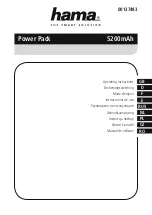
Table 4. Location codes (continued)
Components
Physical Location Code
CRU LED
Firmware version
Um-Y1
Reference codes
Reference codes are diagnostic aids that help you determine the source of a hardware or operating
system problem. To use reference codes effectively, use them in conjunction with other service and
support procedures.
The BladeCenter PS700 Type 8406 blade server produces several types of codes.
Progress codes:
The power-on self-test (POST) generates eight-digit status codes that are known as
checkpoints
or
progress codes
, which are recorded in the management-module event log. The checkpoints
indicate which blade server resource is initializing.
Error codes:
The First Failure Data Capture (FFDC) error checkers capture fault data, which the service
processor then analyzes. For unrecoverable errors (UEs), for recoverable events that meet or exceed their
service thresholds, and for fatal system errors, an unrecoverable checkstop service event triggers the
service processor to analyze the error, log the system reference code (SRC), and turn on the system
attention LED.
The service processor logs the nine-word, eight-digit per word error code in the BladeCenter
management-module event log. Error codes are either
system reference codes (SRCs)
or
service request
numbers (SRNs)
. A location code might also be included.
Isolation procedures:
If the fault analysis does not determine a definitive cause, the service processor
might indicate a fault isolation procedure that you can use to isolate the failing component.
Viewing the codes
The PS700 blade server does not display checkpoints or error codes on the remote console. The shared
BladeCenter unit video also does not display the codes.
If the POST detects a problem, a 9-word, 8-digit error code is logged in the BladeCenter
management-module event log. A location code that identifies a component might also be included. See
“Error logs” on page 183 for information about viewing the management-module event log.
Service request numbers can be viewed using the AIX diagnostics CD, or various operating system
utilities, such as AIX diagnostics or the Linux service aid “diagela”, if it is installed.
Chapter 2. Diagnostics
15
















































